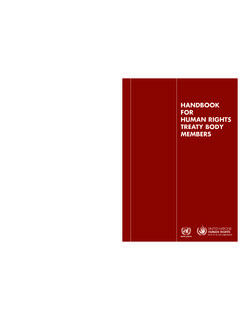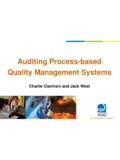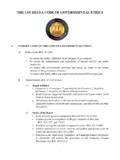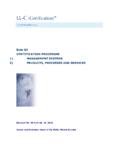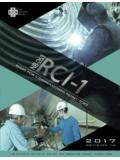Transcription of code of practice2011 - About the ABC
1 code of practice2011 (revised in 2016) code of practice I. Regulatory Framework 1 II. Scope of the code 2 III. Resolved Complaints 3 IV. Principles and Standards 4 1. Interpretation 4 2. Accuracy 4 3. Corrections and clarifications 5 4. Impartiality and diversity of perspectives 5 5. Fair and honest dealing 7 6. Privacy 8 7. Harm and offence 8 8. Children and young people 9 V. Associated Standard: Television Program Classification 10 ABC code of Practice 2011 (revised in 2016) Australian Broadcasting Corporation 2016 ISBN: 978-1-921832-06-2 700 Harris Street, Ultimo NSW 2007 I. Regulatory Framework The ABC Board is required, under section 8(1)(e) of the ABC Act, to develop a code of practice relating to its television and radio programming, and to notify this code to the Australian Communications and Media Authority ( the ACMA ).
2 A complaint alleging the ABC has acted contrary to its code of Practice in its television or radio programming may be made to the ABC. A complainant is entitled under section 150 of the Broadcasting Services Act 1992 (Cth) ( the BSA ) to take their complaint to the ACMA if, after 60 days, the ABC fails to respond to the complainant or the complainant considers the ABC s response is inadequate. Section 150 of the BSA empowers the ACMA to investigate a complaint alleging the ABC has, in providing a national broadcasting service, breached its code of Practice. The ACMA can decline to investigate the complaint under section 151 of the BSA if it is satisfied that the complaint does not relate to the ABC code of Practice, or that the complaint is frivolous or vexatious or was not made in good faith.
3 The ACMA s jurisdiction under sections 150-151 does not encompass the ABC s print content or content disseminated by the ABC over the internet or through mobile devices. However, the ACMA has separate jurisdiction under Schedule 7 of the BSA in relation to content hosted on websites or transmitted through mobile services where that content is either prohibited content 1 or age-restricted content 2. The ACMA is empowered under Schedule 7 to require content service providers and content hosts to remove or prevent access to these types of content. The ABC voluntarily complies with the Content Services code developed by the Internet Industry Association and registered as an industry code with the ACMA under clause 85 of Schedule 7 of the BSA.
4 The Content Services code does not apply to content delivered through online or mobile services where that content has been previously transmitted on radio or television. Except as expressly provided by the BSA, the regulatory regime established by the BSA does not apply to the ABC: section 13(5) of the BSA, and section 79 of the ABC Act. 1 Prohibited content essentially involves content that is classified either as RC (Refused Classification) or X18+. This includes real depictions of actual sexual activity, child pornography, detailed instruction in crime, violence or drug use; and age-restricted content. 2 Age-restricted content involves content classified as R18+ or MA15+ that is delivered through a mobile device or through a service that provides audio or video content for a fee.
5 This type of content must be subject to a restricted access system, measures put in place to protect children under the age of 15 from exposure to unsuitable material. This category of content includes material containing strong depictions of nudity, implied sexual activity, drug use or violence, very frequent or very strong coarse language, and other material that is strong in impact. ABC code of Practice 1 II. Scope of the code The requirements of this code are set out in the sections dealing with Interpretation and Standards in Part IV and the Associated Standard in Part V. The Standards in Part IV apply to radio and television programs broadcast by the ABC on its free-to-air television or radio broadcasting services.
6 The Associated Standard in Part V applies only to television programs broadcast by the ABC on its domestic free-to-air television services. This code does not apply to any complaint which the ABC had decided not to investigate or, having accepted it for investigation, decided not to investigate further, where the ABC was satisfied that: the complaint concerns content which is or becomes the subject of legal proceedings; the complaint was frivolous or vexatious or not made in good faith; the complaint was lodged with the ABC more than six weeks after the date when the program was last broadcast by the ABC on its free-to-air radio or television services, unless the ABC accepted the complaint for investigation after being satisfied that it was appropriate to do so, having regard to: - the interests of the complainant in the subject matter of the complaint; - the seriousness of the alleged breach; - the reason(s) for the delay; - the availability of the program content which is the subject of the complaint; and - any prejudice the delay may otherwise have on the ABC s ability to investigate and determine the matter fairly.
7 Or the complainant does not have a sufficient interest in the subject matter of the complaint, where the complaint alleges a breach of Fair and honest dealing (Standards ) or Privacy (Standard ). To avoid any doubt, the ABC intends that any complaint falling within the terms of any one of the above categories is not relevant to the ABC code of Practice, for the purposes of section 151(2)(b) of the BSA. In effect, this means that only complaints which the ABC has accepted for investigation in accordance with the above criteria are eligible under this code to be reviewed and investigated by the ACMA. 2 III. Resolved Complaints The ABC seeks to comply fully with the code and to resolve complaints as soon as practicable.
8 A failure to comply will not be a breach of the code if the ABC has, prior to the complaint being made to the ACMA, taken steps which were adequate and appropriate in all the circumstances to redress the cause of the complaint. To illustrate, a failure to comply with Standards or (Accuracy) will not be taken to be a breach of the code if a correction or clarification, which is adequate and appropriate in all the circumstances, is made prior to or within 30 days of the ABC receiving the complaint. ABC code of Practice 3 IV. Principles and Standards 1. Interpretation In this code , the Standards must be interpreted and applied in accordance with the Principles applying in each Section.
9 From time to time, the ABC publishes Guidance Notes which do not in themselves impose obligations on the ABC, but which may be relevant in interpreting and applying the code . The Standards in Parts IV and V are to be interpreted and applied with due regard for the nature of the content under consideration in particular cases. The ABC is conscious that its dual obligations for accountability and for high quality can in practice interact in complex ways. It can be a sign of strength not weakness that journalism enrages or art shocks. The Standards are to be applied in ways that maintain independence and integrity, preserve trust and do not unduly constrain journalistic enquiry or artistic expression.
10 2. Accuracy Principles: The ABC has a statutory duty to ensure that the gathering and presentation of news and information is accurate according to the recognised standards of objective journalism. Credibility depends heavily on factual accuracy. Types of fact-based content include news and analysis of current events, documentaries, factual dramas and lifestyle programs. The ABC requires that reasonable efforts must be made to ensure accuracy in all fact-based content. The ABC gauges those efforts by reference to: the type, subject and nature of the content; the likely audience expectations of the content; the likely impact of reliance by the audience on the accuracy of the content; and the circumstances in which the content was made and presented.





